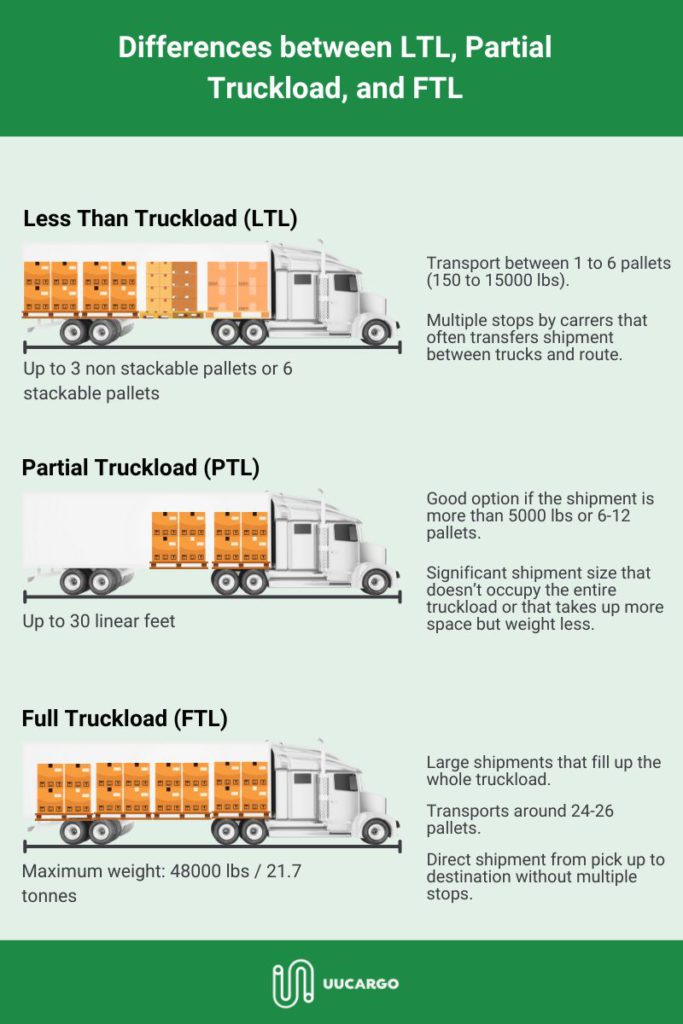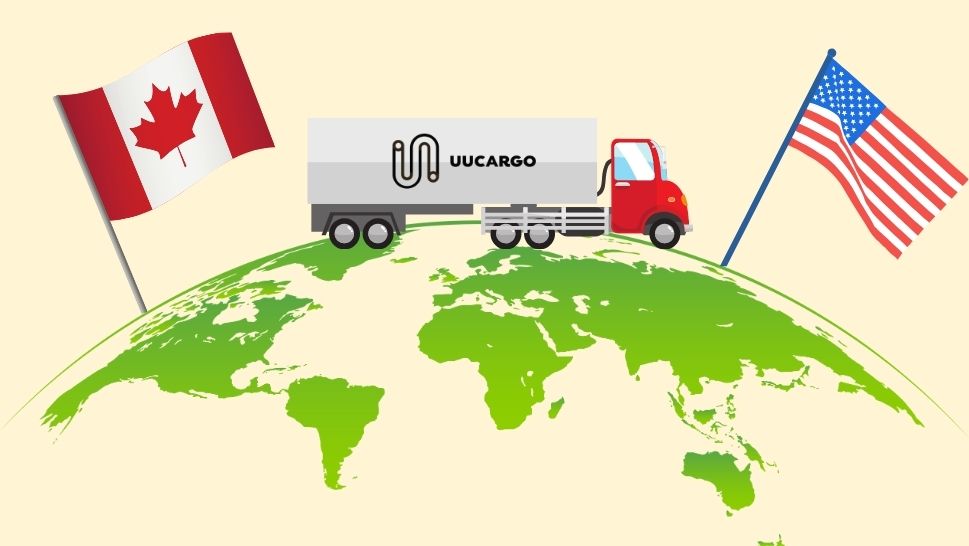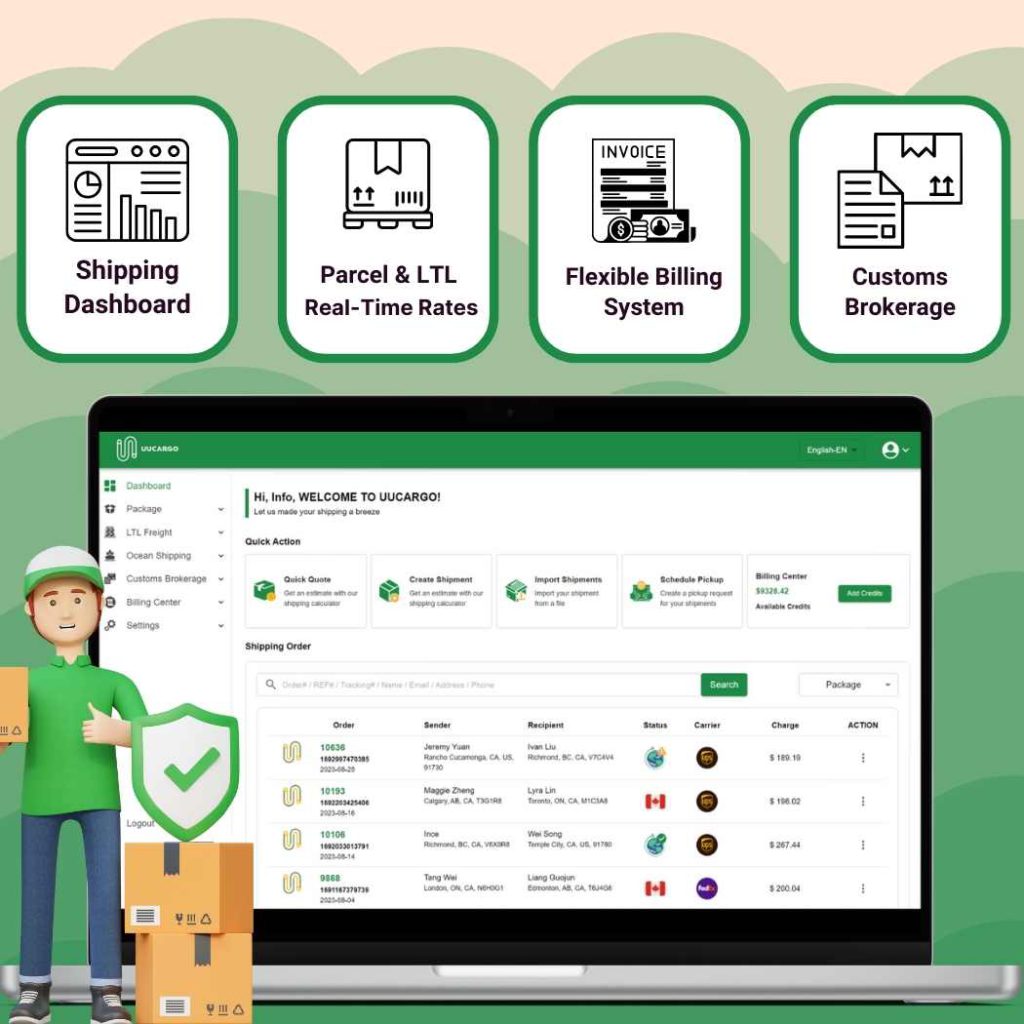Table of Contents
What is LTL Shipping?
Less than Truckload, commonly known as LTL shipping, is a transportation method where your freight shares space in a trailer with goods from other companies. This method is characterized by two critical elements: P&D (Pickup and Delivery) and linehaul. P&D involves the collection and delivery of your goods, while linehaul refers to the transportation of your freight from the origin to its destination, involving multiple handling stages along the route.
LTL is typically utilized for smaller freight loads. The cost for shipping such loads is determined based on the NMFC (National Motor Freight Classification) system, which considers both the weight and the space occupied by the freight in the trailer. As your shipment occupies only a fraction of the trailer’s capacity, LTL carriers maximize efficiency and affordability by consolidating multiple shipments in one truck. This method helps keep shipping costs more economical compared to other methods like partial truckload shipping, making it an attractive option for businesses with smaller shipping volumes.
What is PTL Shipping?
Partial Trucking (PTL) shipments are classified as shipments in the 5-pallet to 20-pallet range, weighing up to 30,000 pounds. But that doesn’t mean the trailer is used exclusively to transport your freight; the carrier can pick up some other products from other companies to fill the remaining space on the trailer. What is the difference between LTL and PTL? PTL freight typically makes multiple stops along the route, but unlike LTL freight, once the trailer leaves the consolidation location, it is not unloaded until it reaches its final destination.
What is FTL Shipping?
Full Truckload, often referred to as FTL shipping, caters to the transportation of large shipments that necessitate the use of an entire trailer. This mode of shipping provides an exclusive space for your cargo, meaning the entire trailer is dedicated to your shipment alone. FTL is distinguished by its direct delivery approach, offering a seamless and uninterrupted route from the point of origin to the final destination.

LTL vs. FTL freight compared
Size and Weight of Shipment:
- LTL Shipments: Typically range from 150 to 15,000 pounds, accommodating up to 10 pallets. Ideal for smaller shipments.
- FTL Shipments: Necessary for loads exceeding 15,000 pounds and/or 10 pallets. Suited for larger shipments that occupy an entire trailer.
- FTL for Fragile Cargo: Offers less handling and movement, reducing the risk of damage or theft. Best for fragile or high-value cargo.
- LTL for Shared Space: Involves more handling due to sharing space with other shipments, potentially increasing risk.
- FTL for Direct Shipping: Offers faster delivery as it goes straight to the destination without additional stops for loading/unloading.
- LTL for Cost-Efficiency: More suitable when cost is a priority over speed, despite having more stops and a longer delivery timeline.
- Volume Shipping (LTL): For loads over 6 pallets weighing 8,000 to 10,000 pounds, offering a more economical choice than FTL for larger LTL shipments.
- Partial Truckloads (FTL): Covers 8 to 18 pallets, weighing 8,000 to 27,500 pounds, sharing space with other cargo but arriving faster than standard LTL.
- FTL for Higher Security: With minimal handling and direct transportation, FTL is generally more secure, ideal for valuable or sensitive shipments.
- LTL for Standard Security: Suitable for general shipments where high security is not a primary concern.
- LTL for Versatility: Offers a range of additional services like white-glove pickups/deliveries, lift gate services, or freeze protection.
- FTL for Simplified Options: More straightforward service offerings, focusing on direct transport of larger loads.
Find the Cheapest Rates
Conclusion
In conclusion, whether LTL or FTL shipping aligns best with your business needs, UUCargo is here to simplify and optimize your freight transportation experience. Our platform offers a seamless solution, tailored to your specific shipping requirements, whether you’re handling fragile items, large shipments, or need expedited delivery. With UUCargo, you gain access to a network of reliable carriers, competitive pricing, and the convenience of managing all your shipping needs in one place. Let UUCargo be your partner in navigating the complexities of freight shipping, ensuring your cargo is delivered safely, efficiently, and cost-effectively. Contact us today to explore how we can enhance your shipping strategy and contribute to the success of your business.




